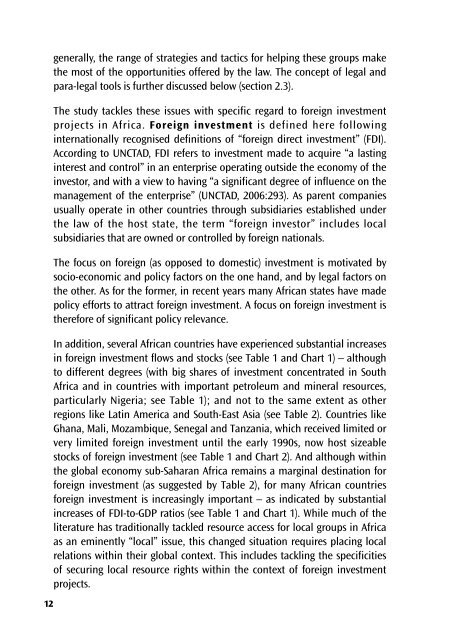Legal empowerment for local resource control
Legal empowerment for local resource control
Legal empowerment for local resource control
You also want an ePaper? Increase the reach of your titles
YUMPU automatically turns print PDFs into web optimized ePapers that Google loves.
12<br />
generally, the range of strategies and tactics <strong>for</strong> helping these groups make<br />
the most of the opportunities offered by the law. The concept of legal and<br />
para-legal tools is further discussed below (section 2.3).<br />
The study tackles these issues with specific regard to <strong>for</strong>eign investment<br />
projects in Africa. Foreign investment is defined here following<br />
internationally recognised definitions of “<strong>for</strong>eign direct investment” (FDI).<br />
According to UNCTAD, FDI refers to investment made to acquire “a lasting<br />
interest and <strong>control</strong>” in an enterprise operating outside the economy of the<br />
investor, and with a view to having “a significant degree of influence on the<br />
management of the enterprise” (UNCTAD, 2006:293). As parent companies<br />
usually operate in other countries through subsidiaries established under<br />
the law of the host state, the term “<strong>for</strong>eign investor” includes <strong>local</strong><br />
subsidiaries that are owned or <strong>control</strong>led by <strong>for</strong>eign nationals.<br />
The focus on <strong>for</strong>eign (as opposed to domestic) investment is motivated by<br />
socio-economic and policy factors on the one hand, and by legal factors on<br />
the other. As <strong>for</strong> the <strong>for</strong>mer, in recent years many African states have made<br />
policy ef<strong>for</strong>ts to attract <strong>for</strong>eign investment. A focus on <strong>for</strong>eign investment is<br />
there<strong>for</strong>e of significant policy relevance.<br />
In addition, several African countries have experienced substantial increases<br />
in <strong>for</strong>eign investment flows and stocks (see Table 1 and Chart 1) – although<br />
to different degrees (with big shares of investment concentrated in South<br />
Africa and in countries with important petroleum and mineral <strong>resource</strong>s,<br />
particularly Nigeria; see Table 1); and not to the same extent as other<br />
regions like Latin America and South-East Asia (see Table 2). Countries like<br />
Ghana, Mali, Mozambique, Senegal and Tanzania, which received limited or<br />
very limited <strong>for</strong>eign investment until the early 1990s, now host sizeable<br />
stocks of <strong>for</strong>eign investment (see Table 1 and Chart 2). And although within<br />
the global economy sub-Saharan Africa remains a marginal destination <strong>for</strong><br />
<strong>for</strong>eign investment (as suggested by Table 2), <strong>for</strong> many African countries<br />
<strong>for</strong>eign investment is increasingly important – as indicated by substantial<br />
increases of FDI-to-GDP ratios (see Table 1 and Chart 1). While much of the<br />
literature has traditionally tackled <strong>resource</strong> access <strong>for</strong> <strong>local</strong> groups in Africa<br />
as an eminently “<strong>local</strong>” issue, this changed situation requires placing <strong>local</strong><br />
relations within their global context. This includes tackling the specificities<br />
of securing <strong>local</strong> <strong>resource</strong> rights within the context of <strong>for</strong>eign investment<br />
projects.

















